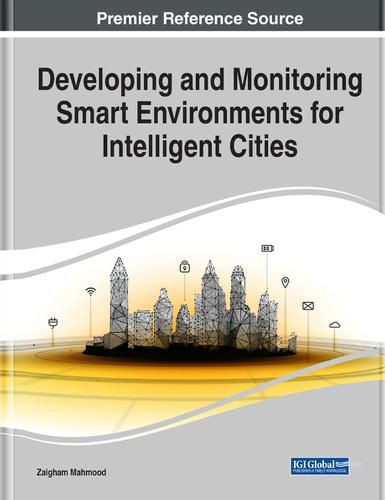Readings Newsletter
Become a Readings Member to make your shopping experience even easier.
Sign in or sign up for free!
You’re not far away from qualifying for FREE standard shipping within Australia
You’ve qualified for FREE standard shipping within Australia
The cart is loading…






This title is printed to order. This book may have been self-published. If so, we cannot guarantee the quality of the content. In the main most books will have gone through the editing process however some may not. We therefore suggest that you be aware of this before ordering this book. If in doubt check either the author or publisher’s details as we are unable to accept any returns unless they are faulty. Please contact us if you have any questions.
In recent years, intelligent cities, also known as smart cities or cognitive cities, have become a perceived solution for improving the quality of life of citizens while boosting the efficiency of city services and processes. This new vision involves the integration of various sectors of society through the use of the internet of things. By continuing to enhance research for the better development of the smart environments needed to sustain intelligent cities, citizens will be empowered to provision the e-services provided by the city, city officials will have the ability to interact directly with the community as well as monitor digital environments, and smart communities will be developed where citizens can enjoy improved quality of life. Developing and Monitoring Smart Environments for Intelligent Cities compiles the latest research on the development, management, and monitoring of digital cities and intelligent environments into one complete reference source. The book contains chapters that examine current technologies and the future use of internet of things frameworks as well as device connectivity approaches, communication protocols, security challenges, and their inherent issues and limitations. Including unique coverage on topics such as connected vehicles for smart transportation, security issues for smart homes, and building smart cities for the blind, this reference is ideal for practitioners, urban developers, urban planners, academicians, researchers, and students.
$9.00 standard shipping within Australia
FREE standard shipping within Australia for orders over $100.00
Express & International shipping calculated at checkout
This title is printed to order. This book may have been self-published. If so, we cannot guarantee the quality of the content. In the main most books will have gone through the editing process however some may not. We therefore suggest that you be aware of this before ordering this book. If in doubt check either the author or publisher’s details as we are unable to accept any returns unless they are faulty. Please contact us if you have any questions.
In recent years, intelligent cities, also known as smart cities or cognitive cities, have become a perceived solution for improving the quality of life of citizens while boosting the efficiency of city services and processes. This new vision involves the integration of various sectors of society through the use of the internet of things. By continuing to enhance research for the better development of the smart environments needed to sustain intelligent cities, citizens will be empowered to provision the e-services provided by the city, city officials will have the ability to interact directly with the community as well as monitor digital environments, and smart communities will be developed where citizens can enjoy improved quality of life. Developing and Monitoring Smart Environments for Intelligent Cities compiles the latest research on the development, management, and monitoring of digital cities and intelligent environments into one complete reference source. The book contains chapters that examine current technologies and the future use of internet of things frameworks as well as device connectivity approaches, communication protocols, security challenges, and their inherent issues and limitations. Including unique coverage on topics such as connected vehicles for smart transportation, security issues for smart homes, and building smart cities for the blind, this reference is ideal for practitioners, urban developers, urban planners, academicians, researchers, and students.